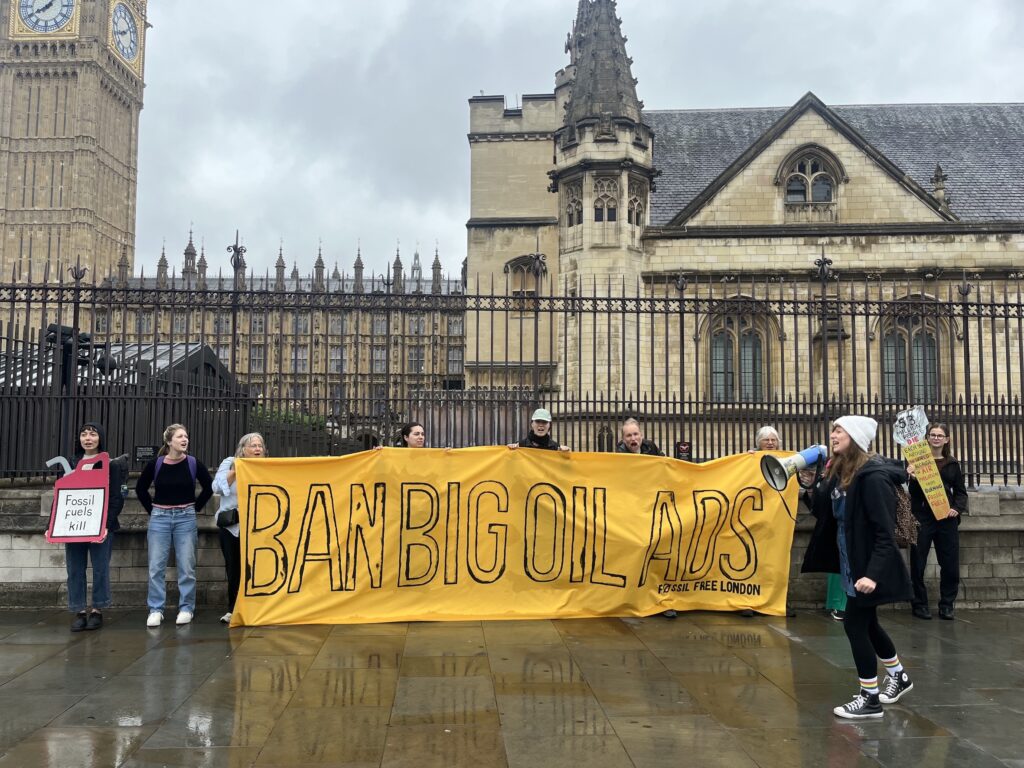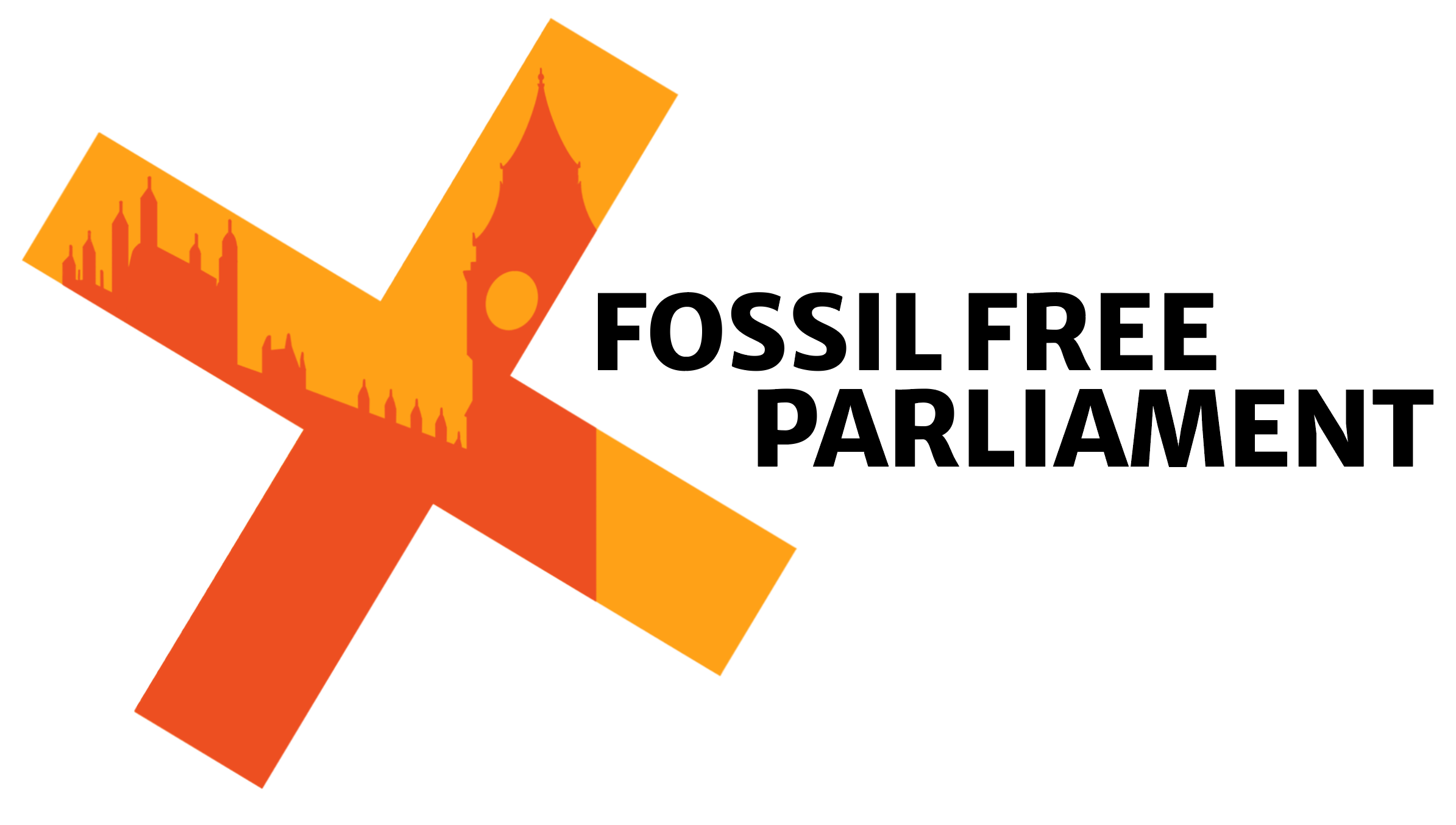
- This Monday, MPs debated restrictions on fossil fuel advertising and sponsorship for the first time in history, with the majority of MPs in attendance arguing in favour of a ban.
- In response, Energy Minister Michael Shanks acknowledged that the climate crisis is the “greatest long-term global challenge we face” and that the government recognises “the huge opportunity that swapping fossil fuels for clean, home-grown energy provides” — but maintained that the government does not currently have plans to ban fossil fuel advertising and sponsorship.
- The debate came after more than 110 000 people signed BBC broadcaster Chris Packham’s petition calling for a ban, and more than 1500 people directly called on their MPs to attend the debate and support a ban.
- Also in the lead up to the debate: 100 UK advertising sector organisations signed a letter calling on MPs to support a ban, and the National Education Union urged schools to boycott the Science Museum over its sponsorship deals with fossil fuel companies
In a lively exchange, MPs debated a “tobacco-style” ban on fossil fuel advertising and sponsorship for the first time in UK history. Members of Labour, the Liberal Democrats, the Green Party and the Conservatives took part in the crucial and timely debate. Of the eleven MPs who spoke, nine presented arguments in favour of a ban, with most citing the immense harm to public health caused by fossil fuel emissions.
Afzal Khan, Labour MP for Manchester Rusholme, referenced the estimated 43 000 deaths each year that are understood to be caused by air pollution, which is mostly attributable to burning fossil fuels. He argued: “the Government must treat this as a public health crisis and act now to ban fossil fuel advertising and sponsorship”.
Other MPs highlighted how sponsoring cultural institutions and sports teams allows fossil fuel companies to paint themselves as positive contributors to society, distracting from and covering up the destruction wrought by their products. As Claire Young, Liberal Democrat MP for Thornbury and Yate, argued: “We must ensure that companies cannot simply use vast sums of money to buy themselves a better reputation, without actually combating the key cause of the concern—in this case, the huge environmental and ecological damage to our planet.”
The impact of fossil fuel advertising and sponsorship on the UK’s climate policy was another key element of the debate. Carla Denyer, Green MP for Bristol Central — who has been a committed campaigner on this issue for many years now — pointed out:
“Let us remember that we are not talking about banning the product; we are just saying that communications that are specifically designed to increase the use of fossil fuels, through misleading claims and by crafting social norms and a social licence for their use and expansion, directly undermining the Government’s evidence-based policy, which is essential to keep us safe from the climate crisis, should not be allowed.”

Communications designed to increase fossil fuel use play a part in “directly undermining the Government’s evidence-based policy” and “should not be allowed”
Carla Denyer, Green MP for Bristol Central, speaking during the debate
Parliamentary Under-Secretary for Energy, Michael Shanks MP, responded on behalf of the government. He acknowledged the seriousness of the climate crisis; the need to transition away from fossil fuels; and the public health arguments for a ban on fossil fuel advertising and sponsorship, due to the “significant impact that emissions have on people’s health”. However, he ultimately argued that the UK’s regulatory bodies are “robust” enough to counter corporate disinformation — despite the significant evidence presented in the debate for how these bodies are not equipped to tackle industry disinformation at scale — and concluded that due to the government’s commitment to “treading a little lighter on people’s lives” they are not “in the business of banning things”.
While the government is treading lightly, the fossil fuel industry is stamping all over us with advertising and sponsorship campaigns that spread disinformation about the role of oil and gas in society and greenwash their reputations. People across the UK and all around the world are feeling this, and calling out for a ban.
The debate was triggered after a petition launched by broadcaster and conservationist Chris Packham gained over 110,000 signatures. Following this, over 100 organisations across the advertising and media sector signed a letter to the government backing a ban, as the UN’s Special Rapporteur on Human Rights & Climate Change also called for a total ban on fossil fuel industry lobbying and advertising.

“We know advertising works – it’s why fossil fuel companies pump billions into billboards, cultural institutions, sports and even our education systems. This dirty money gives mega-corporations the social licence to continue plundering our planet for profit, and it’s killing us. An estimated 30,000 people die each year from air pollution in the UK. It’s long past time fossil fuel ads were banned, for people and planet– let’s get the ban done!”
Chris Packham, broadcaster and conservationist, who organised the petition that led to the debate
The support for the petition is the latest wave in a tide turning against the fossil fuel industry’s freedom to pollute public discourse with its advertising and sponsorship. Over the past decade, numerous UK cultural organisations, including the Royal Shakespeare Company, National Portrait Gallery and Tate, have transitioned away from fossil fuel sponsorship, largely in response to pressure from campaign groups. The British Museum and Science Museum have continued to defend their partnerships with polluting companies, even in the face of a new boycott by schools, supported by the National Education Union.
The UK Health Alliance on Climate Change (UKHACC), Médicins Sans Frontières and The Lancet are among 30 health organisations, representing 12 million health professionals worldwide, that have publicly ended their ties to fossil fuel advertising, while several UK cities including Edinburgh and Sheffield have also introduced bans on fossil fuel advertising and sponsorship.

(Source: Adfree Cities)
The issue of fossil fuel advertising and sponsorship is of special relevance to the Fossil Free Parliament campaign because the industry’s marketing efforts are often directed at policymakers. A briefing document prepared by advertising agency WPP in 2021 for the oil and gas company BP openly mapped out its main channels for influence, including PR, social media, sponsorship and media partnerships In May, BP’s own internal memos were made public revealing how the company leverages cultural sponsorship – alongside advertising campaigns – in order to access and lobby politicians and protect BP from “the policy and politics of climate change”. Similarly, coal giant Adani has used sponsorship of a gallery at the Science Museum to gain substantial political influence. This includes furthering talks on arms and defence collaboration with former Prime Minister Boris Johnson, even as Adani was under investigation for a $265 million bribery scheme to secure energy contracts.
In another egregious example, in 2023, Equinor’s “Broader Energy” campaign ran in the Financial Times, Reuters and The Economist. The ad implied a diverse energy mix including renewables; however, Equinor’s own data showed that 99.85% of its 2023 energy production came from fossil fuels. Equinor later admitted the ads were specifically aimed at influencing political decision-makers. Equinor’s “Broader Energy” campaign was banned by the ASA for being misleading, but not until December, by which point, the adverts had arguably already had their desired impact. That September, its ‘carbon bomb’ Rosebank oilfield bid was approved by the government.
Jacob Collier, Labour MP for Burton and Uttoxeter, raised the issue of fossil fuel advertising-as-lobbying in his opening speech. Referencing DeSmog’s report into fossil fuel advertising across the Transport for London network, he said: “Fossil fuel ads appear in Westminster station, for example, not because consumers need urgent advice about offshore drilling, but because that is where we, the policymakers, walk.”
Representatives from organisations including Badvertising, Culture Unstained, Fossil Free Parliament and Chris Packham’s team were present at the debate, and will be working together to progress the campaign to ban fossil fuel advertising and sponsorship to the next stage. As Jacob Collier MP noted, quoting Chris Packham in his concluding remarks, this debate would “just be the start”.
Read more:
The full transcript of the debate is available here, or watch the full debate on Parliament TV here
Ellen Ormesher in DeSmog, “Compliant Deception”: MPs Warn of Oil Industry Greenwashing at Debate on Proposed Fossil Ad Ban (07/07/2025)
Badvertising, MPs says fossil fuel marketing is “a coordinated strategy” to delay structural change (08/07/2025)
Culture Unstained, Global support for a fossil fuel advertising and sponsorship ban (08/07/2025)
Jonathan Porrit in the Independent: ‘We banned cigarette ads for the good of public health – fossil fuels must be next’ (07/07/2025)
Chris Garrard, Co-Director of Culture Unstained, in Arts Professional: ‘A chance to end fossil fuel sponsorship for good?’ (03/07/2025)
Jonathan Wise, former Global Strategy Director for the Shell account at WPP and co-founder of Purpose Disruptors, in The Drum: ‘I used to create fossil fuel ads, now I’m supporting a UK ban’ (03/07/2025)
